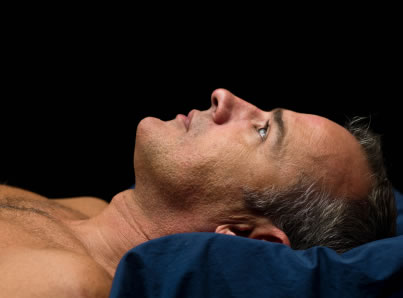
istockphoto
en who have difficulty falling asleep are at greater risk of depression than those who nod off easily, researchers have found.
A study at the Western Australian Centre for Health and Ageing at The University of Western Australia found that difficulty falling asleep doubles the risk of depression in older men.
Sleep complaints are common in later life with nearly 50 per cent of people older than 65 years reporting trouble falling or remaining asleep.
“We found a strong link between difficulty falling asleep and depression which cannot be explained adequately by reverse causality that is, that depression causes insomnia. We didn’t expect to find this result, so it took us by surprise,” said UWA Chair of Geriatric Psychiatry and Director of Research at the Western Australian Centre for Health and Ageing, Winthrop Professor Osvaldo Almeida.
“Excuse the pun, but our results are a wakeup call. I believe that clarifying what drives the association between sleep problems and depression should become an international research priority. Worryingly, our results are consistent with the possibility that the use of sleeping tablets is actually driving this increase in the risk of depression. Addressing this issue may guide the development of prevention strategies to decrease the burden of depression in our society. [continue reading…]

image:stockXpert
new screening tool could help primary care physicians manage their depressed patients by evaluating how much an individual’s condition has improved, according to new research by the developers of the test.
The study authors recommend that primary care physicians use the new Remission Evaluation and Mood Inventory Tool in conjunction with the widely administered nine-item Patient Health Questionnaire.
he PHQ-9 was developed by physicians who received a grant from Pfizer Inc. The questionnaire helps doctors diagnose depression in patients who might be presenting symptoms and select the appropriate treatment by gauging the extent of an individual’s depression. For example, the PHQ-9 asks a patient how often in the last two weeks he or she has felt down, depressed or hopeless.
PHQ-9 measures improvement in symptoms by evaluating if patients are showing fewer of them, with less severity. REMIT is designed to measure positive aspects of a depressed patients’ recovery, with questions about whether patients are feeling happy or in control. The research for this tool was partially supported by a grant from Eli Lilly & Co. Curious? Continue reading
Source: amednew
The new edition of a psychiatric manual called DSM-5 tackles what to do when mourning becomes complicated or leads to depression

Getty Images
Sooner or later most of us suffer deep grief over the death of someone we love. The experience often causes people to question their sanity—as when they momentarily think they have caught sight of their loved one on a crowded street. Many mourners ponder, even if only abstractedly, their reason for living. But when are these disturbing thoughts and emotions normal—that is to say, they become less consuming and intense with the passage of time—and when do they cross the line to pathology, requiring ongoing treatment with powerful antidepressants or psychotherapy, or both? link to continue reading
Source: Scientific American

image:stockXpert
e all have our ups and downs—a fight with a friend, a divorce, the loss of a parent. But most of us get over it. Only some go on to develop major depression. Now, a new study, which will be published in an upcoming issue of Psychological Science, a journal of the
Association for Psychological Science, suggests part of the reason may be that people with depression get stuck on bad thoughts because they’re unable to turn their attention away.
[continue reading…]



